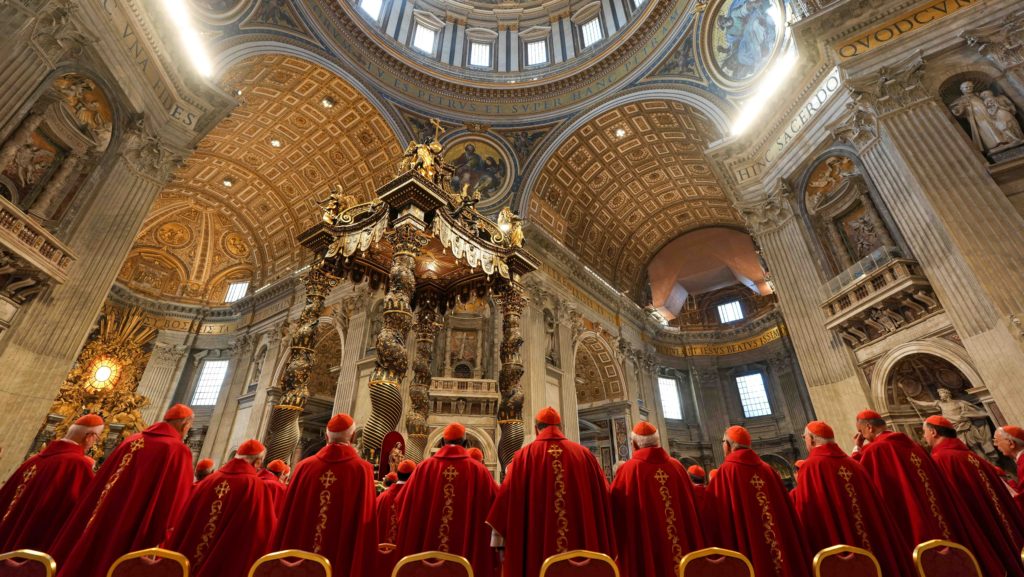With the conclave to elect the next pope set to begin on May 7, there is no one leading the table of “papabile” – the term used for a cardinal likely to become a pope.
There are 135 cardinals under the age of 80 — and thus capable of voting in the conclave — the largest number of papal electors in history (although two have said they won’t attend, as of this writing).
They come from all over the world, and many of them aren’t very well known among their brethren. Many observers think we might have a longer conclave than the last few — which were over after two days — since there are no clear frontrunners and therefore getting the two-thirds total necessary for victory may be difficult.
However, there are several factors at play that would lead to a relatively quick outcome.
First of all, the conclave has a rule that if the voting takes too long, then a pope can be elected with a 50+1 percent of the vote. This means the first cardinal to reach that level can wait it out if he can keep the votes — and most of the cardinals could just vote for him on the next ballot to keep the situation from dragging out.
It is also important to consider that around two-thirds of the electors were appointed by Pope Francis, meaning some continuity is expected.
Now, this doesn’t mean the cardinals do not want some change in the running of the Church. Francis often spoke about “shaking things up” and telling people to “make a mess.” Chances are, most of the conclave’s electors want something a bit calmer this time around.
That doesn't mean there aren't different factions in the College of Cardinals. I would suggest there are four major ones.
First, there are the progressives who want to continue the legacy of Pope Francis with an emphasis on the Church’s role as a “field hospital” that meets people where they are and more open to reaching out to those estranged from Catholic moral teachings. Some of these are more extreme and want the Church to bless homosexual relationships and ordain women to the priesthood. Of course, it is important to realize that different parts of the world see “progressive” and “conservative” in different ways, so it is hard to pigeonhole the “progressive” faction.
This brings us to the conservative faction. There are far fewer “conservative” cardinals than there were appointed by Popes John Paul II and Benedict XVI. It is unlikely we will see one of the few prominently conservative cardinals become pope. However, there are enough of them to influence the college to accept a more moderate cardinal to become pope.
The third faction is the developing-world cardinals, mostly from Africa and Asia. They come from countries where the members of the Church are facing persecution, and are not as interested in the political issues that seem to be primarily a Western concern.
The final faction is the Italians — Pope John Paul II was the first non-Italian pope in over 400 years, and the cardinals of Italy really want a return to the Petrine office. Three of the leading papabile are Italian — Secretary of State Cardinal Pietro Parolin, Cardinal Matteo Zuppi of Bologna, and the Latin Patriarch of Jerusalem Cardinal Pierbattista Pizzaballa.
Pope Francis was 88 when he died, and the fact of the matter is that the cardinals have been speaking to each other privately about his possible successor for years. However, many of the newer cardinals haven’t really been part of these discussions.
There have been four previous conclaves since the end of Vatican II. Pope John Paul I in 1978 and Pope Benedict XVI in 2005 were papabile, and no one was surprised by their elections. Pope John Paul II in 1978 and Pope Francis in 2013 were complete surprises: The first because no one expected a non-Italian; the second because no one expected a non-European.
In 2025, it is possible we might see a new “surprise” such as the first African or Asian pope. At the same time, the cardinals might want more stability and go back to a European — or even Italian — pontiff.
But it is all speculation for those not currently wearing a red hat.
I remember in 2005, I was standing in St. Peter’s Square with another journalist waiting for the second rising of the smoke out of the Sistine Chapel. He asked me if I thought it would be white, declaring a new pope.
“No. It will be black. Ratzinger will be elected on the fourth ballot, and he will choose the name Benedict,” I said. Later that day, I got an email from the guy, thinking I was a genius. But like all the reporters, I was just guessing.
I don’t recall what I told people in 2013, but no one accused me of being a genius. Take everything you see in the media with a grain of salt.

